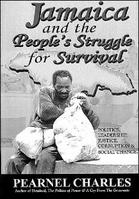
Title: Jamaica and the People's Struggle for Survival
Author: Pearnel Charles
Publishers: LMH Publishers Limited
Reviewer: Robert Hart
Pearnel Charles is currently Jamaica's minister of labour and social security, but just a few months ago he was still in the mire of the political opposition.That's when his latest book, Jamaica and the People's Struggle for Survival, was published.
This latest effort follows his earlier publication, Detained, which presented his recollections of his infamous imprisonment in Jamaica's detention camp during the State of Emergency established by the Michael Manley administration at what was truly the most turbulent period of the nation's history.
attempts at balanced analysis
In his rich account of the political and social history of the nation, Charles seems to try his best to provide a balanced analysis of Jamaica's development from independence, while attempting to enlighten the nation on how the society managed to so severely break down.
However, whether or not you are aware of his political involvement with the Jamaica Labour Party, it is clear at points that Charles, the member of Parliament for North Central Clarendon, is less enthralled with the history of the People's National Party, which was at the time of publication still in charge of the country after 18 years, than his own party.
Speaking of the achievements of the late Michael Manley, the former prime minister and president of the PNP, Charles says, "The failure of Manley to deliver these expectations has been examined ad nauseam. I will not repeat them here suffice it only to recall his promises of free education and the elimination of illiteracy."
Charles makes it clear throughout his book that he has little or no respect for the efforts of the subsequent leaders of the PNP.
Speaking about P.J. Patterson, Manley's successor and the longest-serving prime minister in the nation's history, he says, "Despite his inaugural presentation, 'We must ensure that corruption does not destroy the very fabric of our society. We cannot condone it in any shape or form', Patterson's administration cannot escape responsibility for the many examples of corruption during his administration."
rooted in conflict
On the flip side, however, analysing the administration of JLP leader and 1980s prime minister, Edward Seaga, Charles says, "Many articles have been written apportioning partial blame on Seaga for the politicisation of Jamaican street violence and the exacerbation of the violent political culture during this period. I am not sure that this is so. In fact, one can argue that Manley's socialist ideology was so rooted in the political conflicts, which started some 40 years before, (it) left Seaga with no alternative but to 'fight fire with fire'."
Though Portia Simpson Miller was new to her position as Jamaica's prime minister at the time of his writing, Charles seems unwilling to hold out much hope for what would turn out to be her very short sojourn as the leader of the nation.
"Our new prime minister has come riding on the crescendo of a number of waves. She is black, she is from humble beginnings, she is a woman. That she is black has no relevance since the PNP cannot use this as a slogan against the leader of the JLP, as they did when Edward Seaga held that post. To state that she is from humble beginnings holds no hope (as), after all, so was Patterson."
breaking down history
When Charles is not putting forward his views on the past leaders of the nation, he uses the opportunity to break down the history of Jamaica to examine the crucial role of the trade union movement in 'securing a society of equal rights and opportunities for workers'. It is no accident that Charles holds such high regard for the efforts of trade unions, as he himself is one of the most influential figures of the movement's history.
Jamaica and the People's Struggle for Survival is the conclusion of a trilogy that began with Charles' The Politics of Power and A Cry From the Grass Roots. It is an important piece for readers to absorb in the ongoing effort to understand the Jamaica we live in but, given the writer's deep, passionate and most certainly biased involvement in the events that it attempts to explain, it must be taken for what it is. Charles can never claim to be an independent observer who will give you a balanced diet of Jamaican history but, with that understood, there is no doubt he has much to pass on to the future generations.

